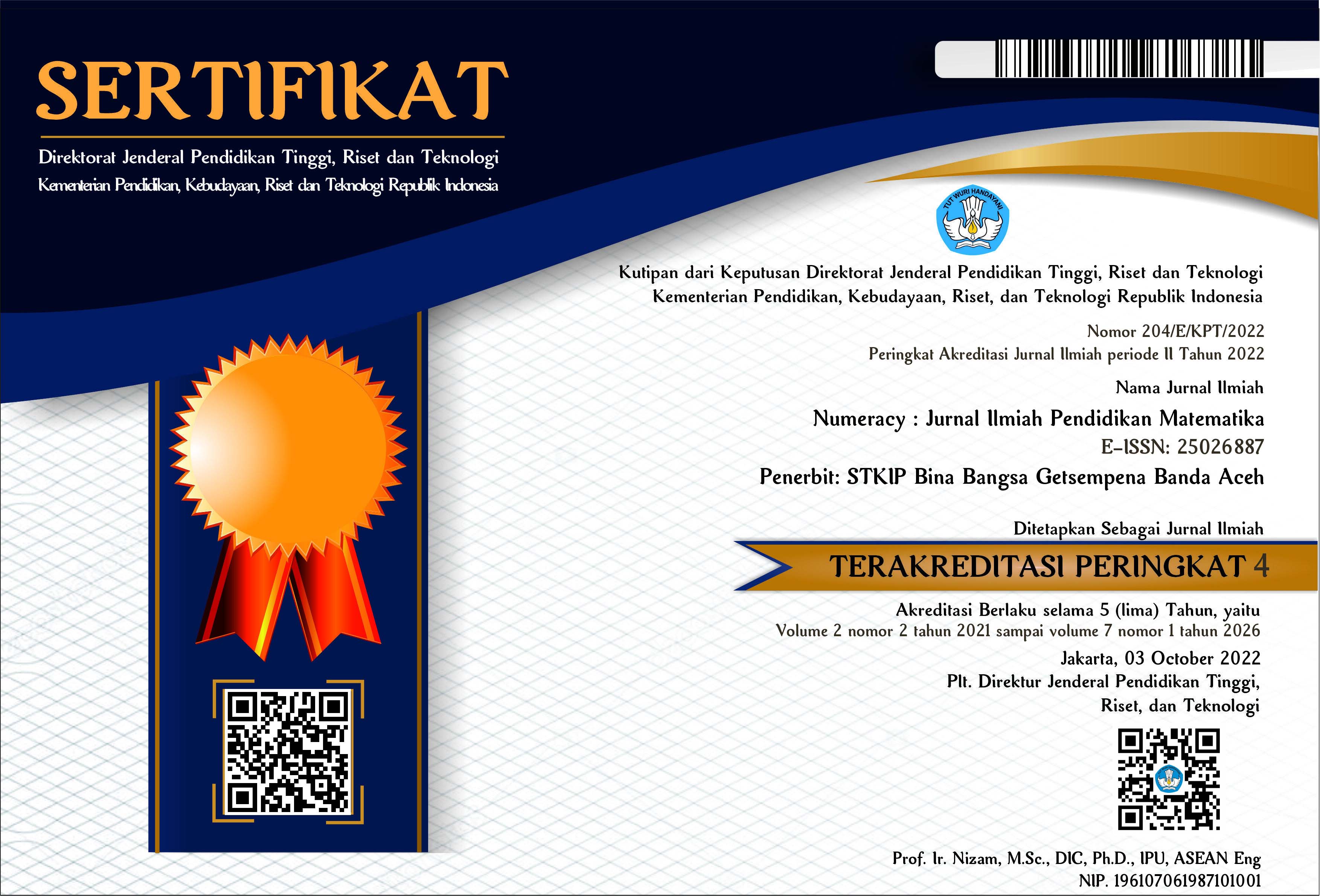MENUMBUHKAN KEMAMPUAN PEMECAHAN MASALAH MATEMATIKA SISWA MELALUI MODEL BELAJAR PBL BERBASIS RICH TASK MATEMATIKA
Abstract
Problem solving skills are essential skill for students to live in a challenging world. Teachers are required to carry out the mathematics instruction that could train these skills. One of the learning models that can be used is problem based learning (PBL) with rich mathematical tasks. Therefore, the purpose of this study is to apply the PBL-based Rich Tasks model to develop students' problem solving skills. This study used one-shot case study experimental design involving 21 grade 9 students from one of the junior high schools in Banda Aceh. The results showed that PBL with Rich Mathematical Tasks was able to develop students' problem solving skills with an average achievement before treatment (pre-test) equal to 2.92 which then improve after treatments given with the score equal to 70.82. In addition, the score of each of the end lesson tests also risen with 62.14 for PB1 and 67.75 for PB2. This improvement was gained because the PBL with rich tasks approach has the potentials to facilitate student learning mathematics. Teachers are advised to use the PBL with rich tasks approach continuously in the daily mathematics instruction, so that students’ problem solving skills can be improved in the future.
Abstrak
Keterampilan pemecahan masalah merupakan skil penting yang harus dimiliki peserta didik agar dapat hidup bertahan dalam dunia yang penuh dengan tantangan. Untuk itu guru dituntut agar mampu melaksanakan proses pembelajaran matematika yang dapat melatih keterampilan tersebut. Salah satu model pembelajaran yang dapat digunakan adalah model belajar PBL berbasis Rich Tasks Matematika. Oleh karena itu tujuan penelitian ini adalah untuk menerapkan model PBL berbasis Rich Tasks untuk menumbuhkembangkan keterampilan pemecahan masalah siswa. Penelitian ini menggunakan desain eksperimen one-shot case study yang melibatkan 21 siswa kelas IX dari salah satu sekolah menengah pertama di Banda Aceh. Hasil penelitian menunjukkan bahwa PBL berbasis Rich Tasks mampu mengembangkan keterampilan pemecahan masalah siswa, dengan rata-rata nilai tes awal sebesar 2.92 yang meningkat pada tes akhir dengan nilai rata-rata sebesar 70.82. Begitu juga dengan nilai tes matematika di akhir setiap pertemuan terus meningkat yaitu 62,14 (P1) dan 67.75 (PB2). Hal ini disebabkan karena model PBL berbasis rich tasks sangat potensial dalam memfasilitasi siswa belajar. Guru disarankan untuk terus dapat menggunakan rich tasks secara kontinue dalam proses pembelajaran matematika sehari-hari, sehingga keterampilan pemecahan masalah siswa dapat ditingkatkan dimasa yang akan datang.
Kata Kunci: Rich Tasks, PBL, Keterampilan Pemecahan Masalah, Pembelajaran Matematika
References
Arasyid, H., Novita, R., & Fitriati, F. (2017). Pengembangan LKS Berbasis Rich Tasks sebagai Upaya Peningkatan Kemampuan Koneksi dan Berpikir Kritis Siswa SMP. Numeracy Journal. Vol.4 No.2. Hal. 169-177.
Darling-Hammond, L. (2012). Policy Frameworks for New Assessments. In Assessment and Teaching of 21st Century Skills. Springer. Hal. 301-339.
Departemen Pendidikan dan Kebudayaan. (2013). Pergeseran Paradigma Belajar Abad 21, Retrieved 20 March 2014 from: http://kemdikbud.go.id/kemdikbud/uji-publik-kurikulum-2013-2.
Fergusson, S (2009). Teacher Used of Mathematical Task: The Impact on Mathematics Learning and Affective Responses Low-attaining Upper Primary Students. In R. Hunter, B. Bicknell, & T. Burgess (Eds.), Crossing divides: Proceedings of the 32nd Annual Conference of The Mathematics Education Research Group of Australasia. Vol.1. Palmerston North, NZ: Merga.
Fitriati, F., Novita, R. (2015). Pengembangan Pendekatan Rich Task dalam Meningkatkan Mutu Pendidikan Matematika. Numeracy Journal. Vol.2 No.1. Hal. 21-31.
Fitriati, F., Novita, R. (2018). Designing student worksheet for rich mathematical tasks. Journal of Physics: Conference Series 0188 012029. doi: 10.1088/1742-6596/1088/1/012029.
Foster, C. (2017). Developing Mathematical Fluency: Comparing exercises and rich task. Educational Studies in Mathematics. Hal. 1-21.
Goos, M., Geiger, V., dan Doley, S. (2013), Designing Rich Numeracy Tasks. Proceeding of ICMI Study 22 Vol 1 on Task Design in Mathematics Education. Oxford UK 2-22 June 2013.
Hadi, S., Retnawati, H., Munadi, S., Apino, E., & Wulandari, N.F (2018). The Difficulty of High School Students in Solving Higher-Order Thinking Skills Problems. Problems of Education in the 21st Century. Vol. 76 No.4. Hal. 521-532.
Kementerian Pendidikan dan Kebudayaan. (2017). Model Silabus Mata Pelajaran Sekolah Menengah Pertama/ Madrasah Tsanawiyah (SMP/MTSN). Jakarta
MacDonald, S, & Watson, A. (2013). What is task? Generating mathematically rich activity, Retrieved 8 July, 2014 from: http://www.atm.org.uk
Moulds, P. (2004). Rich Tasks. Educational Leaderships. Vol. 51 No.4. Hal. 75-78.
OECD (2012). PISA Results: What Student Know and Can Do-Students Performance in Reading, Mathematics and Science. Vol. 1. Tersedia: http://dx.doi.org/10.178/9789264091450.en.
OECD. (2018a). PISA Result in Focus. https://www.oecd.org/pisa/pisa-2015-results infocus.pdf.
Pratiwi, I. (2019). PISA effect on curriculum in Indonesia. Jurnal Pendidikan dan Kebudayaan. Vol. 4 No.1. Hal. 51-71.
Piggot, J. (2012). Rich Task and Contexts, Tersedia: http://nrich.maths.org/5662.
Polya, G. 1981. Mathematical Discovery. New York, NY: John Wiley & Son.
Queensland Educational Department. (2002). Education Queensland Department’s New Basics project: Productive pedagogies. Viewed on 15 October 2010. Tersedia: http://education.qld.gov.au
Retnowati, E., Fathoni, Y., & Chen, O. (2018). Mathematics Problem Solving Skills Acquisition: Learning by Problem Posing or by Problem Solving. Cakrawala Pendidikan. Vol. 37 No.1. Hal. 1-10. doi:10.21831/cp/v37i1.28787.
Saputra, M. D., Joyoatmojo, S., Wardani, D.K., & Sangka, K.B. (2019). Developing Critical-Thinking Skills Through the Collaboration of Jigsaw Model with Problem-Based Learning Model, International Journal of Instruction. Vol.12 No.1. Hal. 1077–1094.
Stacey, K. (2011). The View of Mathematics Literacy in Indonesia. Journal on Mathematics Education (Indo-MS_JME), Vol.2 No.1. Hal 1-24.
Stein, M. K., Grover, B. W. & Henningsen, M. (1996). Building Student Capacity for Mathematical Thinking and Reasoning: An Analysis of Mathematical Tasks Used in Reform Classrooms. American Educational Research Journal, 33(2), 455–488.
Suardja, Z. A., Fitriati, F., dan Novita, R. (2015). Pengembangan Perangkat Pembelajaran Rich Task Untuk Meningkatkan Kemampuan Mengajar Matematika Untuk Guru Sekolah Menengah Pertama. Jurnal Maju. Vol. 4 No.1. Hal. 12-25.



















